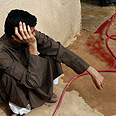
Water shortage in Syria
צילום: AFP
Expert: Damascus to remain without water this year
Syria spends 90% of its water on industry and agriculture, while Damascus residents are forced to buy water in black market, fear catastrophe. Transporting from Euphrates River costs $2 billion, can only be executed if funded by Japanese government
Mufak Khalouf, head of the Damascus Water Supply and Sewerage Authority, warned recently that the Syrian capital may remain without water.
Khalouf, who spoke at a special conference held in Damascus under the banner, "Water – the responsibility of all of us," said that the city was marching towards a catastrophe in terms of water supply, if the country failed to take swift action to solve the problem.
According to Khalouf, the problem was the result of the lack of rain this winter, as Damascus leans almost completely on the rain and snow water to fill its water reservoirs.
The amount of precipitation in Damascus and its surroundings have amounted to 100 millimeters (3.9 inches) so far, while the average amount this period reaches 300 millimeters (11.8 inches).
Khalouf noted that Damascus was still using the rain water collected during the winter of 2002, which was especially showery, with an amount of precipitation of more than 1,000 millimeters (39.37 inches).
He added that the main problem Damascus was suffering from was that 90% of its water consumption came from the industry and agriculture sector, and that the demand from these industries in the past few years has only increased.
The severe water shortage in Damascus was already felt in the summer, when the taps in many neighborhoods, especially in the periphery, remained without water and residents were forced to buy water in the black market.
Severe drought
The Syrian authorities are aware of the problem and have taken a series of steps over the past few years, including the development of additional wells and the replacement of the piping system in order to prevent leakage and waste. Khalouf said, however, that this wasn't enough.
"If we don’t do something fast, we'll be facing a catastrophe we have not witnessed for the past 50 years," Khalouf warned at the conference.
Syria has been suffering from a severe drought in the past five years, which have not only hurt private consumers but also the agriculture industry.
The Japanese government has been trying to help Damascus solve its water crisis, with humanitarian aid given to Syria in exchange to benefits in future projects. A $50-million project funded by Japan's government to replace 100 kilometers (62 miles) of piping in Damascus was completed in 2004.
The Japanese have already declared that they would continue investing in water-related Syrian projects.
A study conducted by Japan's International Cooperation Agency estimated that Syria would have to invest billions of dollars in order to avoid a severe water crisis in Damascus.
These days, the Syrians are trying to interest Japan in a water transportation project from the Euphrates River to Damascus, which is believed to cost about $2 billion. The Syrians understand they won't be able to execute this project with the limited budgetary means at their disposal.
Dr. Gil Feiler is founder and managing director of Info-Prod Research (Middle East) Ltd, and Doron Peskin is head of research










